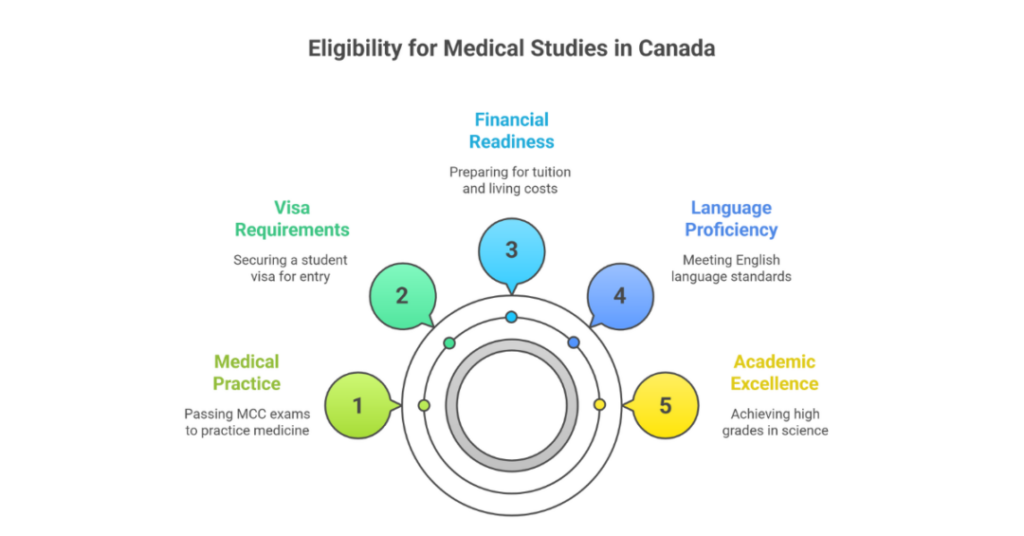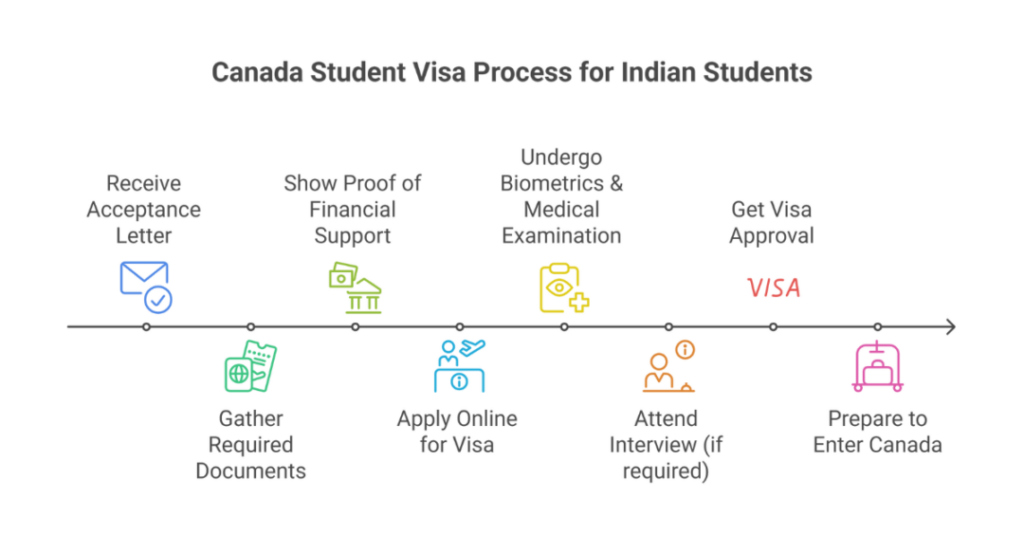12 August 2025
6 minutes read
Study Medicine in Canada After 12th: A Complete Guide for Indian Students

Key Takeaways
- Study medicine in Canada after 12th requires a pre-med + MD route, as direct MBBS is not offered by Canadian universities.
- Meeting Class 12th science grade requirements, MCAT scores, and visa criteria is essential for admission.
- Expert guidance from Ambitio can strengthen your profile and improve acceptance into top medical universities.
Over 15000 Indian students have aspirations to study medicine in Canada post-compulsory education; however, for most, they come to grips with a hard truth: Canadian universities do not offer a direct MBBS course. In fact, medical colleges in Canada require an undergraduate degree before entering medical school.
This makes MD in Canada University for Indian students increasingly competitive, expensive, and demanding. Nevertheless, those who are willing to deal with admission requirements, the Medical College Admission Test and high tuition, Canada offers world-class medical education, high-ranking universities, and options for global employment.
Why Study Medicine in Canada After 12th as an Indian Student?
Choosing to study medicine in Canada after 12th gives Indian students access to world-class medical education, top universities, and globally recognized medical degrees. While Canadian universities do not offer direct MBBS in Canada, students can pursue an undergraduate degree before entering medical school in Canada.
- High-quality medical colleges in Canada with advanced facilities
- Globally valued MBBS degree and medical course in Canada
- Diverse courses in Canada after 12th for international students
- Strong job prospects for medical graduates worldwide
Eligibility Criteria to Study Medical Course in Canada After 12th for Indian Students
To study medicine in Canada after 12th, Indian students must meet specific academic, language, and visa requirements. Since Canada does not offer direct MBBS, students first pursue a bachelor’s degree in medical science or related fields before entering a medical school.

Below are the key eligibility criteria explained in detail:
1. Students must complete Class 12th with strong science grades
For medical studies in Canada, students who have completed Class 12th should have studied Physics, Chemistry, and Biology, securing at least an average med school GPA or 70–80% marks. This strong foundation is essential for admission into the best medical courses in Canada or pre-med programs in Canada before applying to medical colleges.
2. Appear for the Medical College Admission Test (MCAT) before applying for a medical degree
Indian students are required to clear the MCAT to enter Canadian medical schools. This test assesses knowledge in biology, chemistry, physics, and critical reasoning, and is mandatory for most universities that offer MBBS-equivalent programs in Canada.
3. Meet English language proficiency requirements for Canada for international students
As Canada for international students uses English as the primary medium, applicants must prove proficiency through IELTS, TOEFL, or PTE. A minimum IELTS band score of 6.5–7.0 is usually required for courses in Canada for international students.
4. Secure a Canada student visa
Before starting a medical course in Canada, students need a valid Canada student visa. This involves submitting proof of admission to a college in Canada, financial statements to cover fees in Canada, and compliance with immigration rules.
5. Prepare for high tuition fees in Canada and other costs
The cost of studying MBBS or medical degree in Canada can range from CAD 20,000–60,000 per year, depending on the program in Canada and the medical universities in Canada chosen. Students should also budget for living expenses, health insurance, and books.
6. Colleges in Canada provide foundation and medical diploma courses
For students who are interested in shorter pathways, medical diploma courses in Canada or short medical courses in Canada are offered by certain colleges in Canada. These can help students gain entry into healthcare fields while working toward a medical degree later.
7. Indian students are required to meet Medical Council of Canada standards
Medical graduates must pass the Medical Council of Canada (MCC) exams to practice medicine in the country. This applies to those who pursue MD in Canada or complete any medical degree in Canada and wish to stay and work.
10 Top Medical Universities in Canada for Indian Students
Pursuing study medicine in Canada after 12th means targeting the best institutions that combine cutting-edge research, global recognition, and top-quality medical education.
These medical universities in Canada offer diverse programs, from pre-med to MD, making them ideal for ambitious Indian students.
| University Name | Location | Specializations Offered | Average Annual Tuition Fee (CAD) | Global Ranking (QS 2025) |
|---|---|---|---|---|
| University of Toronto | Toronto, Ontario | Medicine, Surgery, Medical Research | 45,000–60,000 | 21 |
| McGill University | Montreal, Quebec | Medicine, Neurosciences, Public Health | 25,000–48,000 | 30 |
| University of British Columbia | Vancouver, BC | General Medicine, Pediatrics, Oncology | 40,000–55,000 | 34 |
| University of Alberta | Edmonton, Alberta | Family Medicine, Surgery, Internal Medicine | 25,000–45,000 | 96 |
| Queen’s University | Kingston, Ontario | Medicine, Anesthesiology, Psychiatry | 28,000–46,000 | 198 |
| Western University | London, Ontario | Medical Science, Orthopedics, Cardiology | 30,000–48,000 | 203 |
| McMaster University | Hamilton, Ontario | Medicine, Health Sciences, Bio-Medical Research | 35,000–50,000 | 189 |
| University of Calgary | Calgary, Alberta | General Medicine, Emergency Medicine | 24,000–43,000 | 182 |
| Dalhousie University | Halifax, Nova Scotia | Medicine, Pediatrics, Surgery | 22,000–40,000 | 298 |
| Memorial University of Newfoundland | St. John’s, Newfoundland | Medicine, Family Practice | 12,000–20,000 | 751–760 |
Admission Process to Study MBBS in Canada After 12th for International Students
For those aiming to study medicine in Canada after 12th, the admission process is competitive and structured. Aspiring medical students from 12th grade must first complete a pre-medical pathway before applying to universities that offer MBBS-equivalent programs. Canada is known for its top medical courses and host of medical courses that prepare students for global practice.
| Step | Description |
|---|---|
| 1. Complete 12th Grade with Science | Students must finish 12th grade with strong marks in Physics, Chemistry, and Biology to be eligible for various medical programs. |
| 2. Choose a Pre-Med Program | Before you pursue MBBS in Canada, you must complete an undergraduate degree in biology, medical science, or a related field, as Canada does not offer MBBS directly. |
| 3. Prepare for MCAT | Aspiring medical students must take the Medical College Admission Test, which is mandatory for universities that offer MBBS-equivalent degrees. |
| 4. Select the Right University | Students can choose from a host of medical courses at top institutions, depending on their interests and career goals. |
| 5. Meet Language Requirements | Since most programs are in English, proof of proficiency (IELTS/TOEFL) is required for Canada after the 12th applicants. |
| 6. Submit Application & Documents | Apply to the chosen university, ensuring transcripts, MCAT scores, and recommendation letters are included. |
| 7. Receive Admission & Apply for Visa | Once accepted, students can get a Canada student visa to begin their studies. |
| 8. Begin Medical Studies | After pre-med, students can apply to medical school and pursue an MBBS in Canada or MD, joining a popular medical program by 2025. |
Cost of Studying MBBS in Canada for Indian Students
When you plan to study medicine in Canada after 12th, understanding the costs is crucial. While Canada is a top choice for MBBS abroad, the overall expenses.
Canada includes tuition, living, and other academic costs, which can be high, but they come with the advantages of studying MBBS at globally recognized institutions offering top medical courses in Canada.
| Expense Category | Details | Estimated Cost (CAD/year) |
|---|---|---|
| Tuition Fees | At universities that offer MBBS-equivalent programs (MD), tuition ranges depending on the institution and course specialization | 25,000 – 60,000 |
| Living Expenses | Accommodation, food, transport, and utilities for students in Canada after 12th grade | 12,000 – 18,000 |
| Books & Supplies | Textbooks, lab materials, medical instruments | 1,000 – 2,500 |
| Health Insurance | Mandatory for all MBBS abroad students; cost varies by province | 600 – 1,200 |
| Miscellaneous | Personal expenses, recreation, emergency funds | 2,000 – 4,000 |
Student Visa Process for Indian Students to Study in Canada
Securing a Canada student visa is a vital step for Indian students who wish to study medicine in Canada after 12th. Even though Canada without a direct MBBS option requires students to take a pre-med route, the visa process remains straightforward if you follow each step carefully.

This applies to those targeting universities that offer MBBS-equivalent programs.
- Receive Acceptance Letter from a Designated Learning Institution (DLI), ideally one of the universities that offer MBBS-equivalent pathways.
- Gather Required Documents including passport, proof of funds, academic transcripts, and letter of explanation.
- Show Proof of Financial Support covering tuition fees, living expenses, and return travel.
- Apply Online for a Canada Student Visa via the IRCC website, paying the application fee.
- Undergo Biometrics & Medical Examination to prove health eligibility.
- Attend an Interview (if required) to explain study plans and confirm intent to return after studies.
- Get Visa Approval and prepare to enter Canada without delays before your program starts.
Career Opportunities After Studying MBBS Degree in Canada
Graduates who study medicine in Canada after 12th and complete an MD or equivalent degree have diverse career opportunities. They can enter residency programs in Canada, specializing in fields like surgery, pediatrics, or internal medicine. Passing the Medical Council of Canada licensing exams allows them to practice as physicians nationwide.
Many also choose research roles, public health positions, or teaching at universities that offer MBBS-equivalent courses. Internationally, a Canadian MBBS degree is highly valued, opening doors for work in top hospitals, NGOs, and global healthcare organizations, making it one of the major advantages of studying MBBS in Canada.
Conclusion
Choosing to study medicine in Canada after 12th is a life-changing decision—one that demands the right guidance, planning, and profile. With intense competition and complex requirements, having expert support can make all the difference. That’s where Ambitio comes in.
As a leading study abroad consultancy specializing in profile building, we help you craft a standout application, connect with the right programs, and prepare for every step of your journey to study in Canada. Ready to turn your medical dreams into reality? Let’s build your future. Book your free consultation with Ambitio today and start your path to success!
FAQs
What are the eligibility criteria for studying MBBS in Canada?
A strong academic record in 12th medical or equivalent, English proficiency, and in some cases, MCAT scores.
Are there scholarships available for international students?
Yes, many Canadian universities offer scholarships and financial aid for international students.
Can Indian students apply for medical courses in Canada?
Absolutely, Canadian medical colleges welcome Indian students and offer various programs tailored to their needs.
What types of medical courses are available in Canada?
Canada offers a range of courses including MBBS, diploma courses, and specialized short-term programs.
Is it necessary to know French to study in Canada?
While French is an official language in Canada, it’s not mandatory for medical courses, which are primarily taught in English.
What are the career prospects after completing medical studies in Canada?
Graduates can pursue careers as medical practitioners in Canada or other countries, subject to local licensing requirements. They also have opportunities in research, teaching, and specialized medical fields.
How long is the MBBS program in Canada?
The duration of MBBS programs in Canada varies but is typically around 4 to 6 years, including theoretical and practical training.

You can study at top universities worldwide!
Get expert tips and tricks to get into top universities with a free expert session.
Book Your Free 30-Minute Session Now! Book a call now




























